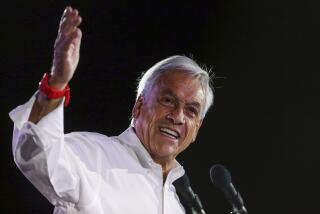This Pope Will Appreciate Chile’s Stand Against Marxism
- Share via
When Pope John Paul II arrives in Chile for the first time in his papacy this week, he will find a country that is gradually moving toward the restoration of representative democracy after nearly falling into the clutches of atheistic communism.
Chile became the only nation in the world to break the shackles of totalitarian communism when its armed forces intervened on behalf of its predominantly God-fearing populace in 1973 to overthrow Marxist Salvador Allende.
Pope John Paul may have a greater appreciation of this feat than most world leaders, since he comes from a nation, Poland, whose yearnings for freedom have been silenced repeatedly by the jackboot of occupying troops.
The Soviet Union has not forgotten its ignominious defeat in Chile. Last year U.S. government experts identified 70 tons of weapons found in underground caches as of Soviet and Cuban origin. Earlier this month Chilean security forces uncovered yet another arms cache, which included 320,000 rifle cartridges and hundreds of rounds for Soviet grenade launchers.
The Moscow-line Communist Party of Chile, the most highly disciplined in the Western Hemisphere outside Cuba, has made no secret of its advocacy of violence. Underground communist terrorists have killed and maimed hundreds of Chileans who got in the way of their bombs and bullets.
Despite this campaign of terror, the government has brought the country back from the brink of socialist chaos and has instituted a series of reforms in the economy that have converted Chile into a model free-market state that is growing economically, improving the lot of all of its people and fulfilling its foreign-debt obligations.
In 1980, 67% of Chileans voted for a constitution calling for a gradual return to democracy by the end of this decade. That constitution requires a plebiscite on a single government candidate in 1989 and congressional elections in 1990. If the government candidate is defeated in the plebiscite, the constitution says that there will be an open election in 1990.
Before this, however, the government is obliged to establish the rules of the game. This it has been doing, although you would never know it by reading some U.S. newspapers.
Last fall the government enacted a new voter-registration law (voter rolls compiled during Allende’s regime were thoroughly rigged and had to be destroyed), and thousands of Chileans have begun to register to vote.
This month another new law was enacted that prohibits foreign funding of political parties and requires public disclosure of their financial records. This will seriously hamper parties that depend on financial assistance from foreign governments or “sister” parties in other countries.
When the Pope steps off his plane in Santiago, he may be greeted with protests against the government. Communists and extreme leftists have insistently demanded an audience with His Holiness. There may even be violence; a prominent Socialist leader, Clodomiro Almeyda, warned of “a hot autumn of hard fighting” in Chile during the Pope’s visit. But the great majority of Chileans will ignore the professional agitators; they will kneel for the papal blessing and thank God that they live in a free country.
More to Read
Sign up for Essential California
The most important California stories and recommendations in your inbox every morning.
You may occasionally receive promotional content from the Los Angeles Times.













